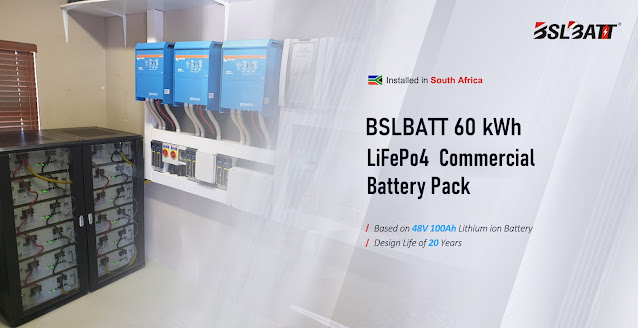The European market for residential storage batteries
Photovoltaic energy storage is now more popular and crucial than ever in many European countries, installed in solar systems in more than 90% of cases.
Residential PV energy storage is now more popular and crucial than ever in many European countries. In fact, to date, residential storage systems are installed in solar installations in more than 90% of cases, according to SolarPower Europe's European Market Outlook 2020-2024. The main reasons for this increasingly popular choice are to be found in two main factors: emotions and economy.
 |
| BSLBATT Powerwall battery |
In fact, in recent years we have witnessed an epochal shift, still in progress, from the traditional supply of energy from fossil fuels to the self-consumption of renewable energy, with an increasing diffusion of the use of batteries to store energy and be able to use it when actually needed. Thanks to a solar photovoltaic system and a storage system, citizens are increasingly independent of the grid and enjoy the energy and economic benefits of a complete photovoltaic system.
The reasons for this change are twofold: on the one hand, the incentives that each country has put in place to facilitate the transition to renewable sources, on the other hand, the increase in electricity prices and, conversely, the steady decline in prices related to photovoltaic systems, making them more attractive to citizens.
The European Market Outlook estimates that the combination of these factors will enable solar and storage systems to achieve grid parity across Europe, including national policy frameworks adapted to EU directives that will facilitate their competitive advantage.
Market evolution: Germany leads, Italy is the second-largest market, followed by the UK, Austria, France, Switzerland, and the rest of Europe
The residential battery storage market has seen, already since 2013 in Germany (the largest European market), a continuous rise also in Italy and UK with the first BESS implementations. Until 2017, Germany, Italy, and the UK remained the leading markets with 90% of total installations: total installed residential storage capacity in Europe represented 350 MWh, and about 2% of all solar PV systems had a battery system. Austria, France, and Switzerland also saw increasing deployment in subsequent years.
In 2018, 65,500 residential BESS systems were commissioned across Europe, with a total capacity of 505 MWh, while 2019 saw a doubling of demand for solar systems with residential storage: last year saw a 57% increase with 745 MWh. This strong growth has resulted in total installed residential storage capacity at nearly 2 GWh, with BESS installations accounting for about 7% of the total in operation in Europe, and it's a market with still plenty of room for expansion, thinking that over 90% of European buildings are still without solar systems.
As with solar, Germany is the largest BESS market in Europe, responsible for two out of every three units installed in homes in 2019. In 2019, 63,000 residential BESS were commissioned, with a total capacity of about 496 MWh. This resulted in 75% annual growth in storage capacity compared to 2018. While the next 4 largest markets - Italy, the UK, Austria, and Switzerland - added 25% of residential BESS in 2019, all other countries shared only 9% of the 745 MWh market volume.
The subsidies allowed the Italian market to develop rapidly and become the second-largest market for residential BESS in 2016. In 2019, approximately 9,000 residential BESS were commissioned, with a total additional capacity of approximately 90 MWh, a 16% growth from the 77 MWh installed in 2018. The Italian domestic battery market enjoys the national tax incentive for small-scale solar PV, the tax credit covering 50% of CAPEX for each homeowner installing a PV system, which was extended to residential BESS in early 2018.
They are followed by the UK, Austria, France, Switzerland, and the rest of Europe with much lower values, including Spain, a pioneer in the solar field thanks to its favorable geographic location. The Iberian country, in fact, is about to enter the European storage rankings. In the U.K., Europe's third-largest market, residential BESS saw only small growth in 2019 with 5,000 residential BESS installed, or about 38 MWh. Austria recorded about 37 MWh of residential storage capacity in 2019, with the BESS market experiencing a 23% growth rate compared to 2018. In France, on the other hand, there is stagnant installed storage capacity in 2019 compared to 2018, with only 3,500 new systems for a total capacity of about 14 MWh: residential BESS is still in an early stage. And an entirely similar situation we find in Switzerland, although the market has seen a 43% increase in residential storage capacity to around 20 MWh.
Technologies on the market for the home
Among the latest storage technologies that power energy for your home is Tesla's Powerwall system: a 'wall-mounted' battery, connectable to your PV system, that supports power supply in the event of a blackout with minimal interruptions, keeping appliances running for days, and automatically becomes the home's energy source in the event of a supply disruption. The system also includes an app to monitor energy production and consumption in real-time.
Proposing a system that allows about 90 percent energy independence, according to the manufacturer, is the SENEC. Home storage system, which adapts to the existing system: SENEC explains how re-injecting excess energy back into the grid is not economically viable, with a return of 14 cents per Kw versus 24 cents for purchase.
With the promise of up to 80% self-sufficiency, Solarwatt offers the Battery Flex system, with storage capacity adaptable to the size of the system, from 4.8 KWh, 9.6 KWh, and 14.4 KWh, as well as overview and control via an app.
With a range consisting of 7 models and capacities up to 12.5 KWh, Fiamm's RES2 also performs a backup function and always guarantees energy continuity even in the event of an interruption. The peculiarity of this system is that they are renewable batteries: the entire product is recyclable and environmentally sustainable. The batteries used, in fact, are collected, recycled, and reused to produce other batteries, creating a virtuous circle.
With modular storage capacity from 2.4 to 14.4 kWh on the market, there is also RA. Store-K by Aton Green Storage, available in 4 sizes of hybrid inverters from 3 to 6kw, this system also adapts to the existing system, confirms the anti blackout function, and, in addition to the monitoring app, integrates the Amazon Alexa function, now increasingly common in the homes of Italians.
The most cost-effective BSLBATT from a Chinese energy storage battery manufacturer has a high flexibility residential energy storage product with easy installation, plug and play, and multiple solutions from 2.5kWh-80kWh. Currently, BSLBATT's leading energy solutions have reached more than 50,000 projects or shipments in Europe, Oceania, Africa, and Asia. It supports customers in achieving energy self-sufficiency, ultimately achieving energy independence and global clean energy goals, and reducing network stress.




评论
发表评论